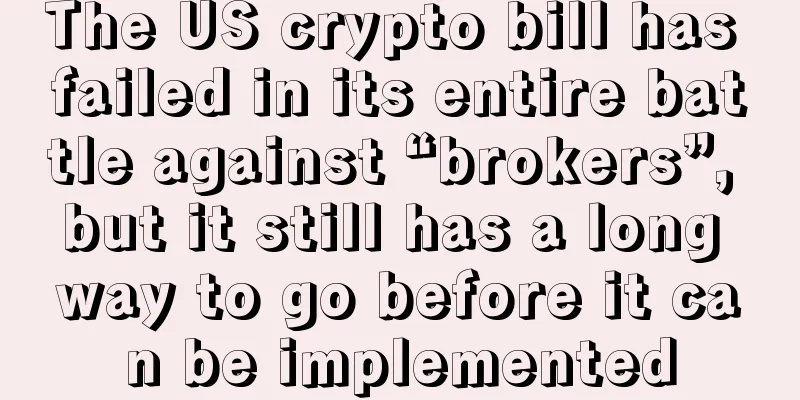The US crypto bill has failed in its entire battle against “brokers”, but it still has a long way to go before it can be implemented

|
Wu Shuo Author | Tan Shu Editor of this issue | Colin Wu Compared with the other side of the ocean where a document "knocked down" an industry, the definition of "broker" in the United States is undergoing complex debates and struggles, and there is still a long way to go before final implementation.The Problem with Cryptocurrency Industry Statement in the Infrastructure Investment and Jobs Act On August 10, the U.S. Senate passed the Infrastructure Investment and Jobs Act (1) by a 69-30 majority. The bill has attracted the attention of cryptocurrency industry practitioners because it involves the taxation of cryptocurrencies. The bill explicitly requires cryptocurrency "brokers" to report transaction information to the tax authorities, and the definition of brokers is "any person who facilitates digital asset transactions on behalf of others." It is estimated that in the next ten years, the cryptocurrency sector will generate $28 billion in tax revenue. However, the definition of "broker" in cryptocurrency transactions in the bill seems too broad in the eyes of the cryptocurrency industry. For example, a miner is obviously a person who facilitates digital asset transactions on behalf of others, but it is obviously unrealistic to require miners to collect information on both parties to the transaction. This is why some lawmakers proposed amendments. Amendment based on cryptocurrency “brokers” Therefore, several senators, including Ron Wyden, Cynthia Lummis and Pat Toomey, proposed the [Wyden-Lummis-Toomey Amendment](2). These senators have a relatively professional understanding of cryptocurrencies, and Cynthia Lummis even holds Bitcoin. The amendment makes a wide range of exclusions for cryptocurrency "brokers". This amendment has also received joint [support] from industry organizations such as Coinbase, Square, and Coin Center(3). However, not long after the Wyden-Lummis-Toomey Amendment was proposed, several other senators, Rob Portman, Kyrsten Sinema, and Mark Warner, proposed the [Warner-Portman Amendment](4), which only excluded two types of "brokers", namely POW miners and private key software providers. In comparison, this proposal seemed to lack understanding of the cryptocurrency industry, and thus attracted widespread opposition within the industry. Subsequently, the main sponsors of the two amendments (except Ron Wyden) reached a compromise and formed a new amendment, which was based on the Wyden-Lummis-Toomey amendment, but only removed the part that exempted "digital assets and their core protocol developers" from being considered brokers. However, due to time constraints, the amendment required unanimous consent from senators to pass. The plan was initially opposed by Senator Richard Shelby from Alabama, and was therefore declared a failure. Implementation of the Act Next, the bill will be submitted to the House of Representatives for discussion in September. Generally speaking, bills passed by the senators will not encounter much resistance in the House of Representatives. However, four congressmen led by Tom Emmer have sent an open letter to other congressmen, [calling on] (5) the congressmen to revise the vague definition of "broker" in the bill. After the House of Representatives passes this bill, the U.S. Internal Revenue Service (IRS) will begin to formulate implementation details for the submission of relevant information, which will be another long process. Therefore, even if the bill is passed according to the current wording, the IRS still needs to resolve the definition of "broker". If highly decentralized organizations such as miners and non-custodial wallets are regarded as exchanges and other institutions, and they are forced to collect and report trader information, these participants will inevitably be "driven out" of the United States, which may not be what policymakers want to see. |
<<: Retail giant Walmart is "testing the waters" and is hiring a cryptocurrency product manager
Recommend
What are the main features of a wealthy man?
From the perspective of physiognomy, in fact, man...
Analysis of the facial features of women who have difficulty giving birth
It is difficult for women with weak constitution t...
Men with crossed eyebrows, is the fate of men with crossed eyebrows good?
Everyone has eyebrows, but the shape of each pers...
The 9th City announced that it will launch NFT platform NFTSTAR
On August 30, Internet company The9 announced tha...
Teach you how to recognize villains by their faces
Teach you how to recognize villains by their face...
Women with these faces are greedy and stingy and very difficult to get along with.
In life, we will meet many different people, and ...
What kind of palm lines indicate the most miserable fate? The most difficult fate
A person's life is always full of various mys...
Which facial features make children smarter?
A person's fortune, character, and wisdom can...
Face analysis: Are you born to be a princess?
Face analysis: Are you born to be a princess? Som...
Palmistry characteristics that indicate failure in doing things
Palmistry characteristics that indicate failure i...
What facial features make women more likely to be deceived by men?
In love, some women are often deceived by their l...
Four major Bitcoin trends for 2019
Rage Review : Now is usually the time when people...
MIT's Second Bitcoin Expo Says No to "Parallel Speech"
From March 5th to March 6th, US time, the Massach...
Is the fortune of a false palm good?
Many people should know that people with a true br...
Ethereum announces launch of first phase of testnet
Ethereum Optimism information shows that Ethereum...









